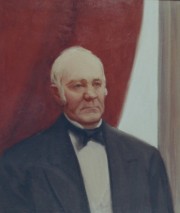(1803-1885) governor of Maine 1863-1864, was born in that part of Canaan now Skowhegan on March 22, 1803. He was the great-grandson of Joseph Weston, one of the town’s first settlers. His brother, Stephen Coburn, was a member of Congress.
After minimal schooling, including a brief stint at Bloomfield Academy, Coburn became an assistant to his father, a land surveyor. In 1825 he began surveying on his own. Soon his father, brother Philander, and he formed a partnership that became a very successful business.
In 1825 he set up business for himself but in 1830 joined his father and a younger brother, Philander, in forming the firm of E. Coburn & Sons, for buying lands and dealing in lumber on the Kennebec River. In 1845 Eleazar Coburn died and the firm was reorganized under the name of A. & P. Coburn. The firm became the largest landowner in the state. It also acquired large timber holdings in Wisconsin, and Abner Coburn obtained fifty thousand acres of timberland by virtue of connection with the Northern Pacific Railroad.*
The future governor was first a Federalist, then a Whig, and finally a Republican. He was elected to the legislature in 1830, 1840, and 1844, becoming one of the founders of the Republican Party in Maine.
He served as Governor from 1863 to 1864 as one of the “War Governors,” committed to fervent support for the Union cause. During the Civil War he received a report from social reformer Sarah Sampson of Bath who was tending the wounded at Gettysburg.
Coburn was generous to his hometown and surrounding communities, supporting the Coburn Classical Institute in Waterville, and Bloomfield Academy in Skowhegan. He presented the town with a courthouse and a public hall named in his honor.
By his will he left over a million dollars to religious, educational, and charitable institutions, much the greater share going to Baptist foundations. Three institutions in which Coburn took great interest during his life and which he remembered generously in his will have given special evidence of their gratitude. Colby College and the University of Maine have each a Coburn Hall and the Waterville Classical Institute changed its name to that of the Coburn Classical Institute.*
Coburn died on January 4, 1885.
Additional resources
*Biographical Encyclopedia of Maine of the 19th Century. Boston: Metropolitan Publishing and Engraving Company, 1885, pp. 137-142.
Chase, Henry. ed. Representative Men of Maine.
Hatch, Louis C. “Abner Coburn.” Dictionary of American Biography Base Set. American Council of Learned Societies, 1928-1936. Reproduced in Biography Resource Center. Farmington Hills, Mich. Thomson Gale. 2005. http://galenet.galegroup.com/servlet/BioRC, with the following recommended readings:
[Williams, Chas. E. Life of Abner Coburn, A Review of the Public and Private Career of the Late Ex-Governor of Maine (1885), is a mere compilation of a eulogistic nature but contains valuable material. Consult in L. C. Hatch, Maine, A History (1919), II, 447-54; Gaillard Hunt, Israel, Elihu and Cadwallader Washburn: A Chapter in Am. Biography (1925), p. 108; G. A. Gordon and S. R. Coburn, Geneal. Descendants of Edward Colburn-Coburn (1913); Bangor Daily Whig and Courier, Jan. 5, 6, 15, 1885.]
Fogg, Clara Newhall. Abner Coburn. Lewiston, Me. Journal Printshop. 1924.
*Williams, Charles E. The Life of Abner Coburn. Bangor: Thomas W. Burr, 1885.
————————
*Cited in Friends of the Blaine House at http://blainehouse.org/governors (accessed April 26, 2011)


